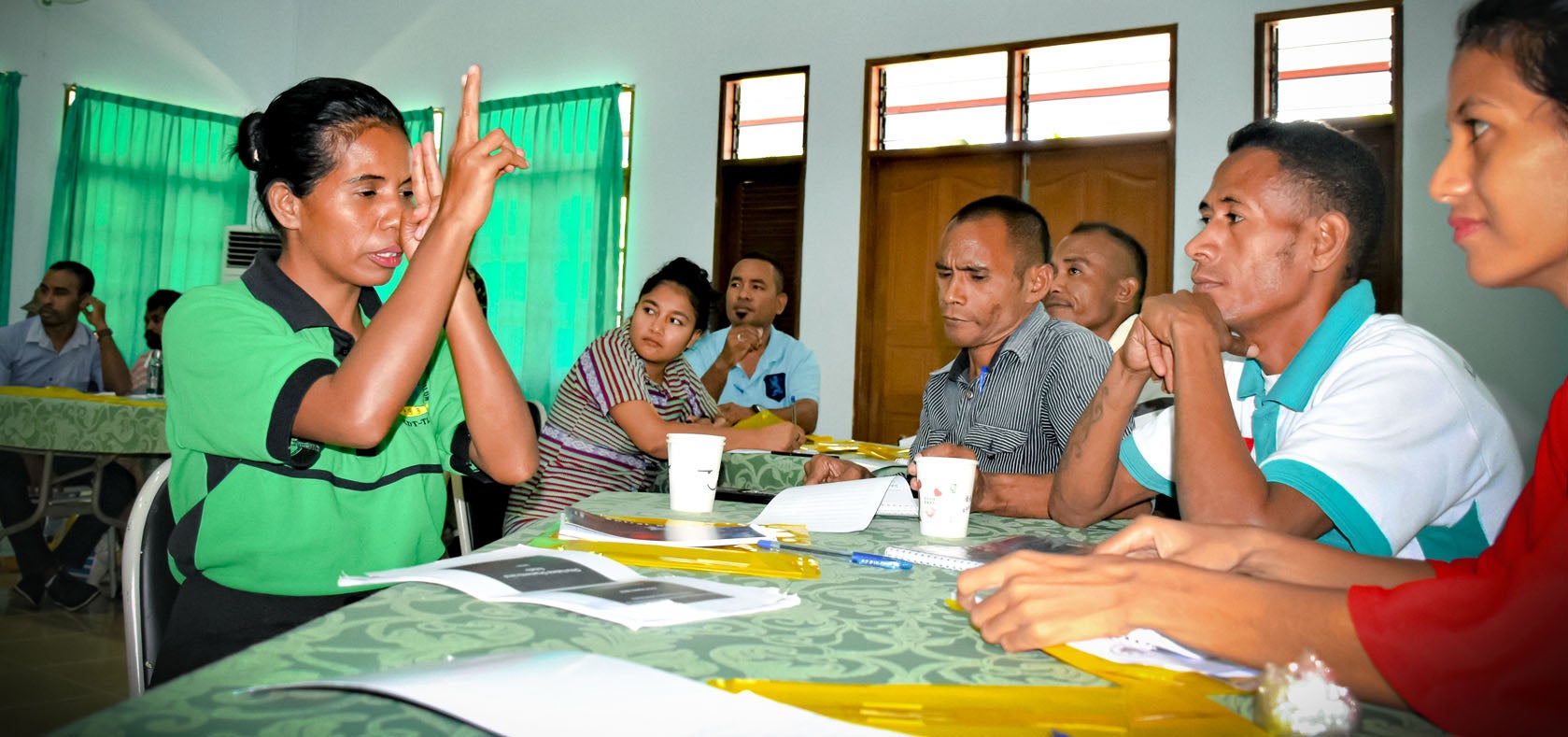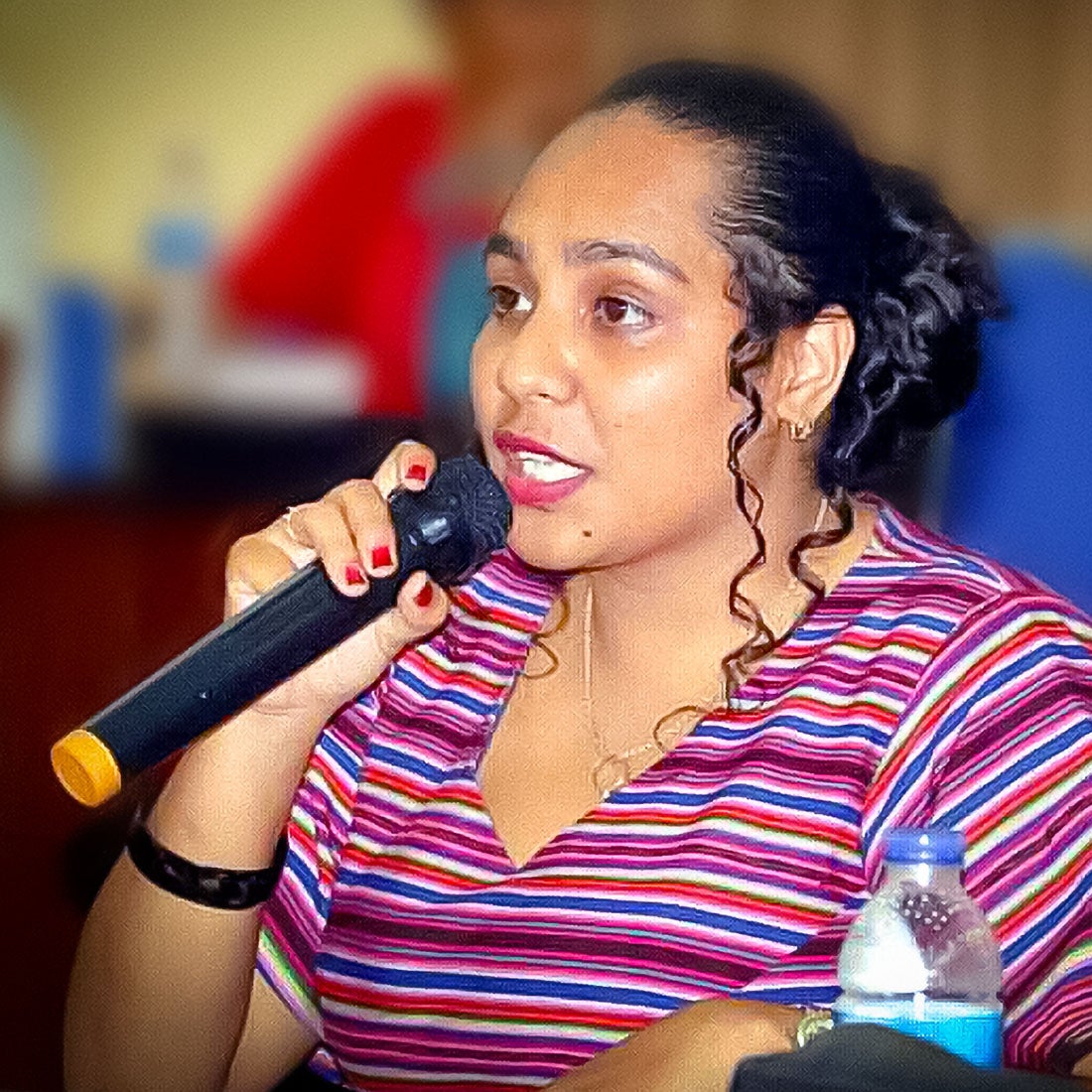Expert’s Take: “Advocating for women and girls’ right to education starts within our homes and communities, stretching to decision-makers.”
Date:
Author: Gertrudes Pereira

About the author

Gertrudes Pereira is the UNPRPD M&E Officer for UN Women Timor-Leste. She joined UN Women back in 2020, after many years admiring UN Women’s role in the struggle for social inclusivity of people with disability (PwD) in Timor-Leste. She previously worked for two PwD organizations, Ra’es Hadomi Timor Oan (RHTO) and Associação Deficientes de Timor-Leste (ADTL), where she dedicated eight years of her career to advocating for PwD rights in society and the participation of women and girls with disabilities at school.
A highlight from her career is after numerous advocacy efforts to the Ministry of Public Works, a Diploma Ministerial was issued to ensure public and commercial infrastructures are PwD-friendly and accessible.
The Timor-Leste National Inclusive Education Policy (2011) has the objective that all residents of the country “should receive equally, an education of good quality appropriate to their individual abilities and should gain the necessary knowledge, capacity and skills – suitable vocation – to support themselves and their families and to participate in all areas of national development,” and the National Education Strategic Plan (2011) affirmed the commitment to achieving an inclusive education to “expand and improve comprehensive early care and education, specially for the most vulnerable and disadvantaged children,” however, figures and the education system in the country beg to differ. There are many barriers blocking us from fully achieving an inclusive education system, particularly infrastructure settings and learning materials suitable for different learners.
In total 10 Ministries and Secretaries of State have developed a National Action Plan for people with disability but there remains a lack of full commitment for implementing the plans, despite the former president of parliament Arão Noé Amaral stating that “government has the obligation to protect persons with disabilities and not to exclude them from development plans and programmes.
There is the perception that only the Ministry of Social Solidarity and Inclusion is responsible for people with disability matters, when in fact, it impacts all aspects of societal development.
As a woman with disability, I am grateful to be able to access education; the issue of women and girls with disabilities being disproportionally left out of school prompted me to embark on the journey to fight for their inclusion and access to education.
Previously I worked with two local organizations for people with disabilities. First with Ra’es Hadomi Timor Oan (RHTO) for three years, where through our advocacy on the accessibility of people with disability in their communities, we managed to build houses and toilet facilities at schools that are people with disability-friendly at municipality level. Aside from this, we worked closely with teachers to promote equal access to education for people with disability by connecting them to institutions that were to provide school equipment and also guide them to access and apply for available scholarships.
Following this, I spent five years working with Associação Deficientes de Timor-Leste (ADTL), the umbrella for organizations of people with disability in Timor-Leste. I was engaged in a lot of advocacy and capacity-building initiatives to help pave the way for people with disability to access opportunities in society, which included increasing the participation of women and girls with disability in education settings. We developed a programme called ‘Equivalent Class’ in 2019, which aims to provide opportunities for adults with disabilities who have never enrolled in school to access education, specially advocating for women with disabilities to participate.
It is important for us to act decisively to ensure women and girls with disabilities have more access to education as the more they are excluded, it becomes harder to escape poverty and disempowerment. This can start within our homes and communities, stretching to decision-makers.
Through important dialogues with parents and members of the community regarding this issue, we can create a better image for women and disabilities, where they are welcomed and respected in all spheres of society.
Finally, all government entities should take more ownership of the issue faced by people with disability, especially women and girls with disability as they are at more risk of discrimination. Investing in and improving inclusive education not only improves the number of women and girls with disability in education, but as teachers are trained and students are socialized to respect people with disability, we can begin to eliminate barriers that separate us from being united.
Expert’s Take: "Halo advokasia ba feto no labarik-feto sira-nia direitu ba edukasaun hahú iha ita-nia uma-laran no komunidade nia leet, no haburas ba ukun-nain sira."
Date: Thursday, September 9, 2021
Author: Gertrudes Pereira

Kona-ba Autor

Gertrudes Pereira mak programa UNPRPD nia ofisiál M&E ba UN Women Timor-Leste. Nia servisu hamutuk ho UN Women iha tinan 2020, hafoin tinan barak nia admira knaar UN Women nian iha luta ba inklusividade sosiál ba ema ho defisiénsia iha Timor-Leste. Antes ne'e nia servisu ba organizasaun Ra’es Hadomi Timor Oan (RHTO) no Asosiasaun Defisientes Timor-Leste (ADTL), ne’ebé nia dedika tinan 8 iha nia advokasia ba direitu ema ho defisiénsia nian iha sosiedade, no feto no labarik-feto ho defisiénsia sira-nia partisipasaun iha eskola.Pontu importante ida hosi ninia kareira mak hafoin esforsu advokasia barak ba Ministériu Obras Públikas, Diploma Ministeriál ida hasai ona atu asegura infraestrutura publika no komersiál sira ne’ebé amigavel no asesivel ba ema ho defisiénsia sira.
Timor-Leste nia Polítika Nasionál ba Edukasaun Inkluziva (2011) iha objetivu katak nasaun nia populasaun hotu-hotu "tenke simu edukasaun ho igualdade, ho kualidade di'ak ne'ebé apropriadu ba sira-nia abilidade individuál no tenke hetan koñesimentu, kapasidade no abilidade – vokasional apropiradu - atu apoia sira-nia aan no sira-nia família no partisipa iha área hotu-hotu ba dezenvolvimentu nasionál nian," no mós iha Planu Estratéjiku Nasionál ba Edukasaun (2011) afirma sira-nia kompromisu atu alkansa edukasaun inkluzivu liuhosi "habelar no hadi'ak kompreensivu kuidadu nian sedu no edukasaun, liuliu ba labarik sira ne'ebé vulneravel liu no sira ne'ebé desfavoresidu liu," maibé, figura no sistema edukasaun iha rai-laran hatudu diferensa. Iha bareira barak ne'ebé impede ita husi alkansa sistema edukasaun ne’ebé totalmente inkluzivu, liuliu aspetu infraestrutura no materiál aprendizajen sira ne'ebé adekuadu ba alunu oin-oin.
Iha totál Ministériu no Sekretáriu Estadu 10 ne’ebé dezenvolve ona Planu Asaun Nasionál ida ba ema ho defisiénsia sira maibé seidauk iha kompromisu tomak atu implementa planu sira ne'e, maske eis-Prezidente Parlamentu Nasionál Arão Noe Amaral hateten ona katak "Governu iha obrigasaun atu proteje ema ho defisiénsia sira no labele esklui sira hosi planu no programa dezenvolvimentu sira.”
Iha persepsaun katak só Ministériu Solidariedade Sosiál no Inkluzaun deit mak responsavel ba ema ho defisiénsia sira, maibé loloos ne’e, asuntu ida-ne'e fó impaktu ba aspetu dezenvolvimentu sosiál hotu-hotu nian.
Nu'udar feto ho defisiénsia, hau agradese tebes tanba bele hetan asesu ba edukasaun; kestaun kona-ba feto no labarik-feto ho defisiénsia sira, ne'ebé husik hela eskola, impede hau atu tuir luta ba sira-nia inkluzaun no asesu ba edukasaun.
Uluk hau servisu ho organizasaun lokál rua ba ema ho defisiénsia sira. Ba dahuluk ho Ra’es Hadomi Timor Oan (RHTO) durante tinan tolu, iha ne'ebé liuhosi ami-nia advokasia kona-ba asesibilidade ba ema ho defisiénsia iha sira-nia komunidade, ami konsege harii uma no fasilidade sentina iha eskola ne'ebé mak sensivel ba ema ho defisiénsia iha nivel munisípiu. Aleinde ne'e, ami servisu hamutuk ho profesór sira atu promove asesu igual ba edukasaun ba ema ho defisiénsia sira hodi liga sira ba instituisaun sira ne'ebé mak atu fornese ekipamentu eskola nian no mós orienta sira atu hetan asesu no aplika ba bolsa estudu ne'ebé mak iha.
Hafoin ida-ne'e, hau servisu hamutuk tinan lima ho Asosiasaun Defisientes Timor-Leste (ADTL), sombriña ba organizasaun ema ho defisiénsia sira iha Timor-Leste. Hau involve iha advokasia no inisiativa hasa’e kapasitasaun barak atu ajuda ema ho defisiénsia sira asesu ba oportunidade sira iha sosiedade, ne'ebé inklui hasa'e partisipasaun feto no labarik-feto sira ho defisiénsia iha área edukasaun. Ami dezenvolve programa ho naran “Klase Ekuivalente” iha tinan 2019, ne'ebé ho objetivu atu fó oportunidade ba ema adultu sira ho defisiénsia ne'ebé nunka rejista iha eskola atu asesu ba edukasaun, liuliu halo advokasia ba feto ho defisiénsia sira hodi partisipa.
Importante ba ita atu foti asaun forte hodi asegura feto no labarik-feto sira ho defisiénsia iha asesu barak liutan ba edukasaun tanba bainhira sira hetan eskluisaun barak liu, ida-ne'e sai susar liu atu halai-sai husi kiak no susar atu hakbiit sira. Ida ne'e bele hahú husi ita-nia uma laran no komunidade nia leet, no haburas ba ukun-na'in sira.
Liuhosi diálogu importante ho inan-aman no membru komunidade sira kona-ba asuntu ida-ne'e, ita bele kria imajen diak liu ba feto ho defisiénsia sira, iha ne'ebé sosiedade simu sira no respeita sira.
Ikus liu, entidade governu hotu-hotu tenke sai na'in ba asuntu ne'ebé ema ho defisiénsia sira hasoru, liuliu feto no labarik-feto sira ho defisiénsia tanba sira iha risku ba diskriminasaun bo’ot liu. Investe no hadi'ak edukasaun inkluzivu laos deit hadi'ak númeru feto no labarik-feto sira ne'ebé ho defisiénsia iha edukasaun, maibé profesór sira mos sei treinadu no alunu sira sei sosializa atu respeita ema ho defisiénsia sira, ita sei hahú elimina bareira sira ne'ebé haketak ita nia unidade.